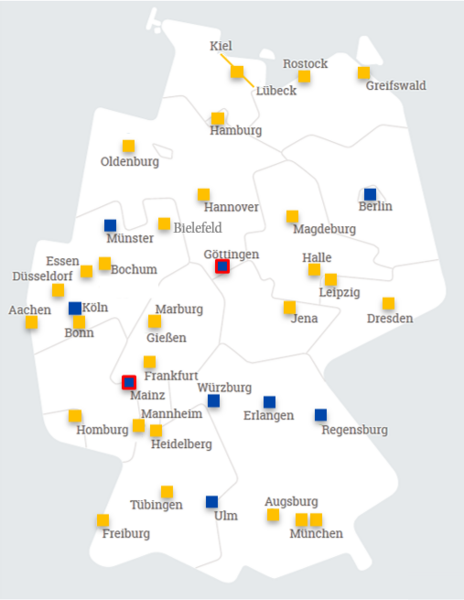COMPASS
Profile
Abstract
In times such as the COVID-19 pandemic, the smartphone is the central means of communication to share health information quickly and reliably, even during measures such as lock-down and social distancing. The variety of pandemic apps, i.e. apps that were developed in hackathons to master COVID-19, for example, shows the great potential that many experts see in them. But for apps to be effective in the pandemic, they must be used by many people. This is not only true for the Corona-Warn-App, but especially for apps for the assessment of individual risk, e.g. for certain pre-existing conditions. It is therefore essential that such apps enjoy the trust of the general population and that data for medical research can be evaluated together with the consent of the users. This raises important questions for users, such as appropriate data protection and data control. On the other hand, developers are confronted with the problem of developing apps that are user-friendly and conform to data protection regulations, even under extreme time pressure, since in times of a pandemic every day counts. Within the framework of COMPASS, we will build a platform for the sustainable coordination of best practices in the development and deployment of pandemic apps according to the state of the art in science, technology and legislation, based on the numerous experiences gained in recent months. This includes the provision of concrete methods and tools for the use of health apps in a pandemic. The aim is to create the organizational and technical prerequisites for the fastest and best possible use of mobile apps in the future to cope with pandemics.


Challenges
Assessing the current situation and managing the pandemic requires a digital solution that is technically as low-threshold as possible, which on the one hand can be used by the population quickly and as easily as possible, but on the other hand can also be used independently of individual healthcare players. For a better understanding of the pandemic, it is essential that data is collected and made available in a way that is compatible with research. Many university hospitals have developed mobile pandemic apps in a very short time. This applies, for example, to questions such as how the pandemic is spreading and what consequences this will have for patients with different clinical pictures. Currently, many of these COVID-19 apps exist as isolated solutions, where neither the legal, regulatory nor technical possibilities exist to combine and use the data collected via these apps for COVID-19 related research. Many apps serve an identical or similar purpose and collect similar - but currently not comparable - data. The effectiveness of the apps in the fight against the pandemic in Germany has also hardly been evaluated so far, so that benefit-risk assessments, for example for data protection aspects, are extremely vague at the moment. Furthermore, there is still too little information available on whether the needs of those affected (both researchers and clinicians) are actually being addressed by the available pandemic apps.
Solutions
COMPASS is an interdisciplinary project in which scientists from a wide range of disciplines at university hospitals join forces with partners from science and industry to develop a coordination and technology platform for pandemic applications. This platform is to become an integral part of the University Medicine Network, complementing the research data platform and providing guidelines and methods for the most effective, efficient and research-suitable use of health apps to combat a pandemic. In addition to best practices and guidelines, app components such as interfaces or questionnaires as well as templates for terms of use and privacy statements will be developed. The necessary speed in the processing of the content is achieved through appropriate preparatory work and synergies with other projects. Initially, the COMPASS project will pool the expertise and experience in the use of pandemic apps of nine university hospitals and external partners. With the help of this experience, a joint solution will be created in the short term, which on the one hand takes into account the legally compliant use of pandemic apps, but on the other hand also allows the apps to be integrated more easily into existing solutions for better data exchange. The project combines existing and deployed pandemic apps in an open source modular solution and a corresponding modular development (NUM app), which can either be used directly by other partners in its existing form or adapted within the framework of defined guidelines to take into account local peculiarities or new issues.


Added Value
The nationwide network of partners from science and industry will contribute to sustainably anchoring the development and use of digital solutions in pandemic management through the coordinated collection, preparation and evaluation of pandemic apps and the preparation of recommendations for action. By coordinating and agreeing on best practices and jointly developing software components for pandemic apps as an open source solution, duplication of work can be avoided, health apps can be developed efficiently and used in a way that effectively supports health care, research and society in managing pandemics. The interoperability and research compatibility of the apps developed in this way will improve the comparability and mergeability of the collected data in the medium term. The more information that can be jointly analyzed, the faster and more reliably new outbreaks of infection can be detected nationwide, risk factors can be identified and those affected can be informed in a more targeted manner. Interoperable and research-compatible pandemic apps, as developed in COMPASS, can thus contribute significantly to the understanding and management of COVID-19 and, in the long term, of future pandemics.
Participating University Hospitals
The following university hospitals of the University Medicine Network are participating in the COMPASS project:
- Charité - University Medicine Berlin
- University Medicine Göttingen
- University Medicine Mainz
- University Hospital Würzburg
- University Hospital Cologne
- University Hospital Münster
- University Hospital Regensburg
- University Hospital Ulm
- University Hospital Erlangen
